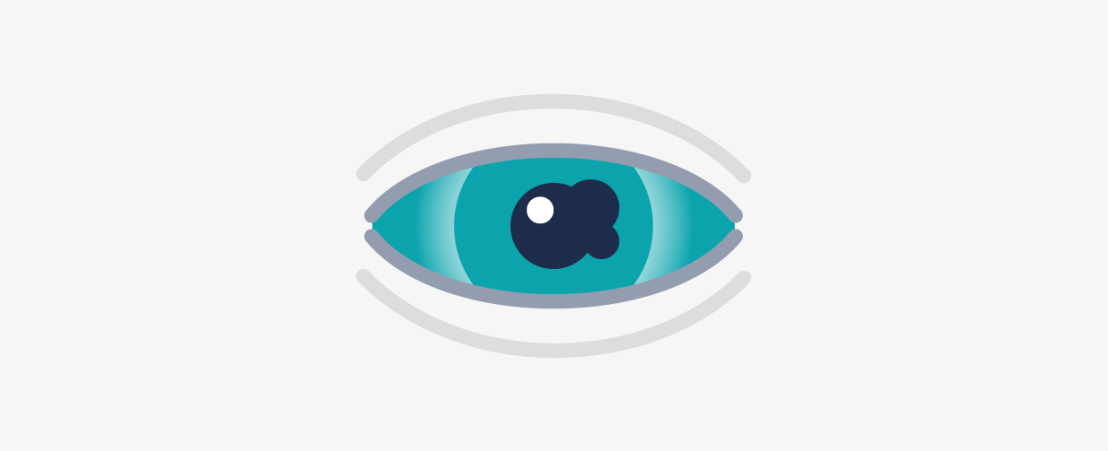
The term uveitis refers to a range of inflammatory conditions that affect the middle layer of the eye known as uvea.
The anterior part of the uvea is called the iris, the coloured part of the eye that controls the light entering the eye.
Behind the iris lies the ciliary body, a circular band of tissue that provides the internal fluid (aqueous humor) of the eye, and changes the shape of the crystalline lens allowing us to see clearly at different distances.
Between the light sensitive layer of the eye, the retina and the white outer shell, the sclera lays the choroid, which consists of a well-packed layer of pigmented cells and blood vessels that supply the retina with oxygen.
There are different types of uveitis depending on the location of the inflammation.
Anterior uveitis or iritis is the most common type, and it is when the inflammation is located in the iris or in the ciliary body.
Intermediate uveitis refers to the inflammation affecting mostly the vitreous humor or jelly-like substance that fills the eye. Sometimes it is also called vitritis or pars planitis.
Posterior uveitis is when the inflammation affects the layers at the back of the eye like the choroid (choroiditis), or the retina (retinitis). It can also affect the retinal blood vessels, a condition known as vasculitis.
Panuveitis is the term that describes the presence of inflammation both at the front and the back of the eye.
It will mostly depend on the type of uveitis. Not all the signs and/or symptoms may be present at the same time.
Anterior uveitis: May include redness, pain, or sensitivity to light, even blurriness of vision.
Intermediate and posterior uveitis: They are usually painless unless there is associated anterior uveitis. Most patients complain of floaters (black dots, cobweb), and loss or distortion of vision.
These symptoms may appear suddenly and last only a few months or they may present slowly over a period of a few weeks and become chronic.
Most cases of anterior uveitis are acute but have a recurrent course with alternating periods of quiescence between attacks.
There are many different causes of uveitis.
Autoimmune: The immune system is the body’s defence system against foreign pathogens such as bacteria or viruses. When the immune system breaks down, it does not recognise “self” from “foreign” and attacks its own body, in this case the eye. Often the inflammation is limited to the eye but it can be associated with other autoimmune medical disorders.
Some people have a genetic predisposition to develop certain autoimmune conditions, which in turn have an increased risk of developing uveitis. These include ankylosing spondylitis, ulcerative colitis, Crohn’s disisease, psoriasis among many others.
Infection: Occasionally a virus i.e., herpes, bacteria i.e., tuberculosis or a parasite i.e., toxoplasma enters the eye causing and infection with associated inflammation.
Trauma: Any injury to the eye including previous ocular surgery can lead to the development of inflammation.
Idiopathic: Often it is not possible to detect any specific cause for the development of uveitis, and although it may be autoimmune in origin, we label these as idiopathic or of “unknown cause”.
In order to diagnose the type and whenever possible the cause of the uveitis, the doctor will take a medical history and ask questions about your past ocular and general health that might be related to your uveitis.
Then you vision will be check at every visit, as well as your intraocular pressure. The eye will be examined at the slit-lamp and your pupils will be dilated using eye drops to facilitate examining the back of you eye.
Additional tests such as an OCT (Optical Coherence Tomography), visual fields or retinal angiography may be requested to assess possible complications caused by the inflammation i.e., cataracts, glaucoma or retinal oedema.
Furthermore, some blood test and/or x-rays may be necessary to help finding the cause of the uveitis.
Treatment will depend on the type of uveitis and the severity of the inflammation.
Should the uveitis be secondary to an infection, antibiotics, or antiviral drugs will be added to your treatment.
Most of the anterior uveitis will respond to steroid eye drops, which will be administered fairly frequently at first and then tapered down.
Dilating drops will also be given to relieve pain and to avoid the iris from sticking to the lens, which will preclude examining the back of the eye and help reducing the risk of having raised intraocular pressure. These will cause temporary blurriness of vision and light sensitivity.
When the inflammation affects the vitreous humor, choroid or retina, eye drops may not be sufficient to treat the inflammation and the use of steroid tablets or injections of corticosteroids around and/or inside the eyeball may be used.
Should steroids alone be unable control the inflammation, immunosuppressant drugs will be used to spare the toxic side effects that steroids have in the long run.
Contact us or request an appointment with our medical team.